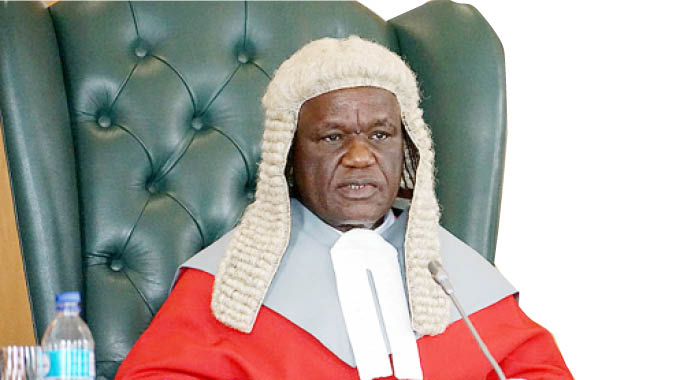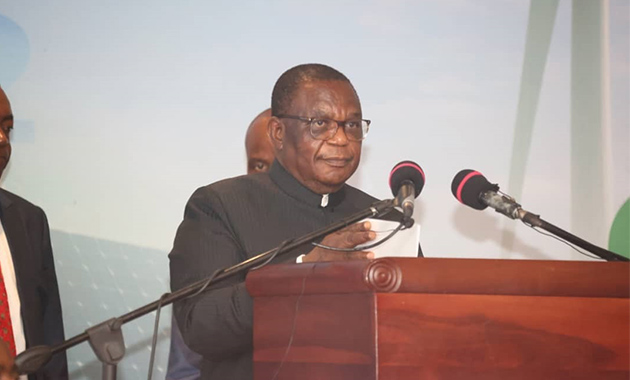One to one for USD debts . . . Supreme Court makes landmark ruling

Mashudu Netsianda, Senior Reporter
THE Supreme Court has ruled that debts which were incurred in United States dollars before new regulations came into force on February 22 last year can be discharged in local currency at the rate of 1:1.
In a landmark ruling by Chief Justice Luke Malaba, sitting with Justices Nicholas Mathonsi and Susan Mavingira on Monday following an appeal filed at the Supreme Court by coal mining company Zambezi Gas Zimbabwe challenging a judgment of the High Court granted in favour of NR Barber (Private) Limited, the superior court said Statutory Instrument 33/19 that came into effect last year provided for US denominated debts to be converted to the local currency at 1:1 rate.
In papers before the court, NR Barber (Pvt) Ltd and the Sheriff of the High Court were cited as respondents.
CJ Malaba said judgment debts, denominated in US dollars immediately before February 22 last year, the effective date of Statutory Instrument 33 of 19, shall on or after that date be valued in RTGS dollars on a one-to-one rate.
“The court holds that the Presidential Powers (Temporary Measures) (Amendment of Reserve Bank of Zimbabwe Act and Issue of Real Time Gross Settlement Electronic Dollars (RTGS$) under Statutory Instrument 33 of 19, expressly provides that assets and liabilities, including judgment debts, denominated in US dollars immediately before the effective date of February 22, 2019 shall on or after the aforementioned date be valued in RTGS dollars on a one-to-one rate,” he said.
According to the ruling by Harare High Court judge Justice Isaac Muzenda, which the Supreme Court quashed, Zambezi Gas Zimbabwe had been ordered to pay NR Barber (Pvt) Ltd about US$3, 9 million debt for services rendered at Ithuba Mine in Hwange, a few years ago.
Justice Muzenda ruled that section 4 (1)(d) of Statutory Instrument 33/19 cannot be construed as giving the legislature powers to alter court orders, saying allowing that would be a violation of the separation of powers as enshrined in the constitution.
NR Barber (Pvt) Ltd had instituted legal proceedings against Zambezi Gas Zimbabwe for payment of US$3 885 000 for services it rendered. Justice Muzenda ordered Zambezi Gas Zimbabwe to pay the money with five percent interest calculated from the date of summons to the date of full and final payment.
On May 21, Zambezi Gas Zimbabwe deposited RTGS$4 136 806,54 into NR Barber’s account as settlement of the judgment debt including interest and legal costs.
However, NR Barber complained that the money deposited was less than the amount ordered by the court, arguing that it was equivalent to US$144 788,23 using the interbank rate of May 21, 2019.
The contention was that Zambezi Gas Zimbabwe still owed an amount of US$3 992 018,31.
NR Barber then engaged the services of the Sheriff of the High Court to attach Zambezi Gas Zimbabwe’s property for sale in execution.
Zambezi Gas Zimbabwe filed an urgent chamber application to block the execution of its attached property in Hwange and the High Court dismissed it with costs.
Aggrieved by the decision of the High Court, Zambezi Gas Zimbabwe approached the Supreme Court on appeal arguing that the lower court erred in failing to find that the judgment debt for the sum of US$3 885 000 together with costs of suit and interest was a liability to the company valued in US dollars before the effective date as specified in SI 33/19.
Zambezi Gas Zimbabwe, through its lawyer Advocate Thembinkosi Magwaliba who was instructed by Jera and Moyo Legal Practitioners, argued that the High Court erred in failing to find that the US dollar denominated debt was capable of being discharged at the rate of 1:1 as specified in section 4(1) (d) of Statutory Instrument 33/19, and therefore failing to find that the company fully discharged the debt on May 21 last year.
CJ Malaba said section 4(1) (d) of S.I 33/19 made it clear that a judgment debt is a contractual obligation which can be applied to all assets and liabilities that shared the prescribed characteristics except those referred to in section 44 of the principal Act.
“The court a quo construed the words ‘immediately before the effective date’ to mean that the expression of the value of the liability in US dollars ought to have occurred as an event at a time ‘immediately before the effective date,” he said.
CJ Malaba said section 4(1)(d) of S.1 33/19 provides that all assets and liabilities that were valued and expressed in US dollars immediately before the effective date shall on and after the effective date be deemed to be values in RTGS dollars at a rate of 1:1 to the US dollar.
“What is important is the fact that the liability should have been valued before the effective date in United States dollars and was still so valued and expressed. The judgment debt was ordered against the appellant (Zambezi Gas Zimbabwe) on June 25, 2018 and it was valued and expressed in US dollars and was still so valued and expressed immediately before February 22, 2019.”
He ruled that the payment of RTGS$4 136 806,45 made by Zambezi Gas Zimbabwe as settlement of the judgment debt was a full and final one in terms of section 4(1)(d) of S.1 33/19.
“In the result it is ordered that the appeal is allowed with no costs. The order of the court a quo is set aside and substituted with the following: it is declared that the appellant’s payment of RTGS$4 136 806,45 is a full and final settlement of the first respondent’s judgment debt,” said CJ Malaba
NR Barber, through its lawyers, Dondo and Partners, had accused the coal miner of reneging on its contractual agreement to pay despite its acknowledgement of debt made in February last year. -@mashnets










Comments